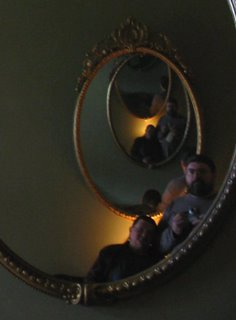
I got some fan-email the other day on a project I did a long time ago, a computer game from Sierra called "Outpost 2." The fan said some nice things, and asked why I didn't have anything about the game on my websites.
Well, it certainly isn't because I'm ashamed of the project. In fact, I remember it very fondly for a number of reasons.
Frankly, it's great that, after all these years, I still get fan-mail off
Outpost 2. It was a great experience for me, I learned a lot about writing in the process, made some money, got a free trip to WorldCon, and I'm pretty pleased with how it all turned out. On top of that, some people actually took notice of my work and liked it. It is, in fact, my "lost" first published novel! So, by (somewhat) popular demand, let's revisit
Outpost 2.Sherman, set the Wayback Machine for Eugene, Oregon, circa 1996 or so...
Outpost 2 wasn't my first contact with the game company Dynamix (by then a division of Sierra On-line). I'd first done freelance work for them shortly after moving to Eugene. Nothing exciting. I wrote internal documentation for several of the game development tools they were using at the time. I did several manuals, and was told with great enthusiasm that there would be plenty more work for me.
Then the phone didn't ring. I sat around, decided I'd screwed it up in some way, and felt sorry for myself. I really didn't have a great load of confidence in my abilities in those days. In retrospect, I think it likely had more to do with the Sierra take-over than me. Jeff Tunnell, who brought me into Dynamix, had been moved from his seat in charge of Dynamix into his own off-site production house. I don't know what the politics of this were, but there had to be some. Possibly I was just lost in the shuffle (I certainly didn't make myself hard to miss in those days), or possibly I was "tainted" by contact with the "old regime." These things happen in business. In any case, I didn't expect to work for them again.
Then, some time later, after Dynamix had moved from its old offices in downtown Eugene to a new "high-tech" park near the University of Oregon, I heard they were looking for a writer with science-fiction background to do some work on a strategy game. I stuck my foot in the door, and soon found myself working on a project, a turn-based strategy game called "Missionforce Cyberstorm."
Let me just say that, despite the lame title, Missionforce Cyberstorm was a
great game. As I said, it was turn-based strategy, based on a hex grid. You fielded a team of giant robots called "Hercs," piloted by "meat" androids called "Bioderms." You may recognize this as an offshoot of the first-person robot simulator "StarSiege/EarthSiege" franchise, ironically a poor-man's version of the "BattleTech/MechWarrior" franchise that I'm writing novels for now.
The interface was clever, attractive, and easy to use. By the standards of the time, the graphics and sounds were pretty good, and it had an excellent sound-track. It was one of the first games to offer network/internet multiplayer (something I sadly never got to try). At times, it was actually boxed with TWO fully functional CD-ROMs, so you could give one to a friend for network play, and that play was great fun.
In terms of anything word-based though, starting with the name, it sucked. A lot of the terminology and naming just seemed to be somebody jamming words together because they sounded "kewl." As such, I was brought in at the last-minute to overhaul some of the on-line help (also an innovation at the time) and text support files. My most visible contributions to the game are the Bioderm profiles, in which I attempted to do a little world-building and give the game a believable context. I think it made things a little bit better, but I'll state right-out that the reasons this game was good had little to do with me.
I hoped the phone would ring again soon, as at that point the EarthSiege franchise was an ongoing thing, but it didn't. I can't feel too bad, as some of that work went to my friend Dave Bischoff, an accomplished sf writer with over 50 books to his credit. (Dave later farmed out some of this work to me when he got busy, and so I have some uncredited contributions in StarSiege, a game that, to this day, I've never seen or played!)
Finally though, I heard they were looking for a "real" hard science-fiction writer for a project. And again, I put my foot in the door. I didn't have a lot of publication credits at this point, but I'd sold to Analog magazine, by God, so my hard-sf credentials were solid if not massive.
I'd heard of the original
Outpost, a popular space colony simulation game from several years earlier. Imagine a crude (in terms of technology and execution) yet sophisticated (in terms of scientific detail and accuracy) version of SimCity set on another planet, and you have Outpost.
But attempts to create a sequel had hit the rocks. At one time, both late-astronomer Carl Sagan and sf-writer Gentry Lee were attached the project, but despite pouring a lot of money down a hole, a marketable product never emerged.
In desperation, the whole project was purged and started from a clean slate. The mandate was that absolute scientific accuracy was not the object -- good gameplay was. Warcraft was the hot new game at the time, so it became a real-time strategy/combat game in that mold. Brought in to head the project were Patrick Cook and Alan McPheeters, two guys who were (I think, for-sure Patrick, anyway) at that point best known for successful sports games. (One of my most vivid memories of my first visit to Patrick's office was his foam-rubber "cheese-head" hat!)
Also enter, little old me. After Sagan and Lee, I had some big shoes to fill. But I was eager, a team-player, and ready to go. Somehow, I got the job.
This is running on much longer than I planned, so I'll break this now and continue later with another installment of the story. Stay tuned.

















